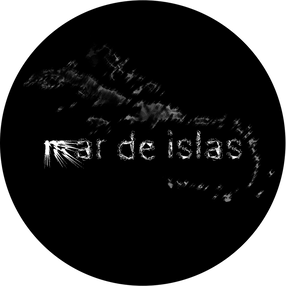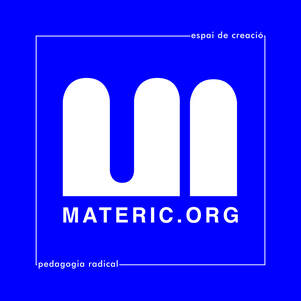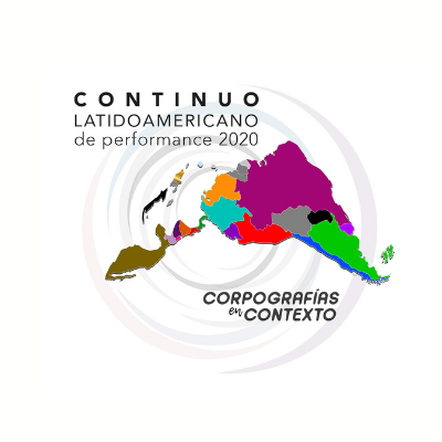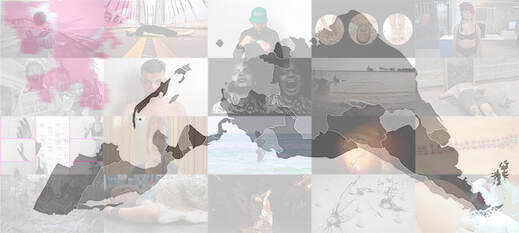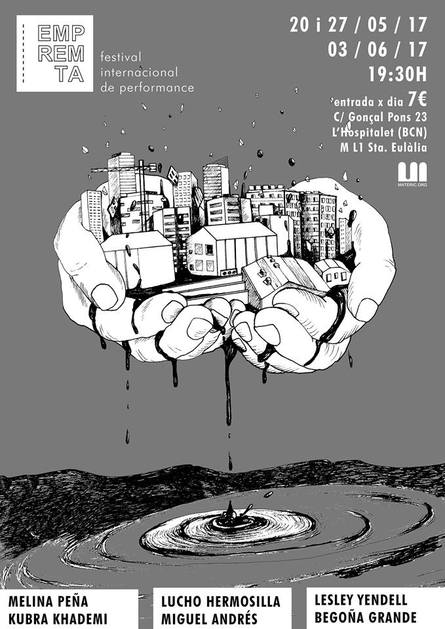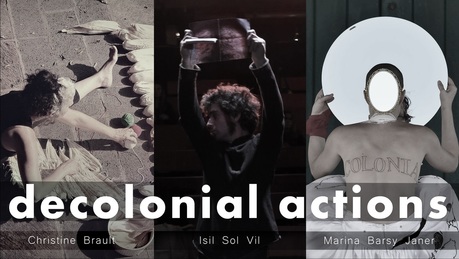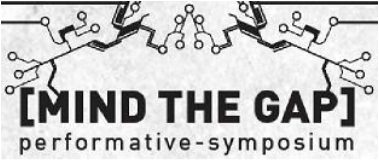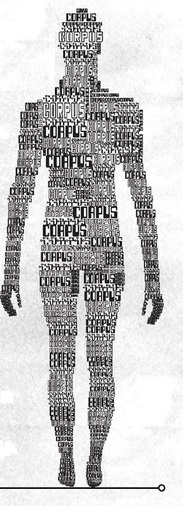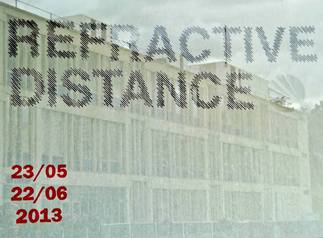CURATORIAL PROJECTS
MAR DE ISLAS encuentro de performance del Caribe
performance encounter of the Caribbean/ Rankont Pefòmans Atis Karayib la/ rencontre d’art performance des Caraïbes
www.mardeislas.pr
performance encounter of the Caribbean/ Rankont Pefòmans Atis Karayib la/ rencontre d’art performance des Caraïbes
www.mardeislas.pr
Concepto
Una mar nos une y nos nombra caribeñxs, la misma que nuestrxs ancestrxs tejieron entre islas creando espacios vivos de comunicación, intercambio, encuentro, cultura y comunidad.
Hoy, desde la invención de las “naciones” impuestas por los colonizadores, la mar Caribe es frontera y muerte. El Caribe es colonizado como otredad, como un Caribe racialmente invisible, fragmentado, exotizado y erotizado para servir de paraíso turístico, de basurero, de experimento y explotación social-económica-científica-agrícola-militar del y para el Norte global. Escribimos desde ese Caribe aislado de sí mismo, capaz de reproducir desde el epicentro de su cuerpa-casa prácticas coloniales. Estos archipiélagos comparten una misma herida abierta. Pero sobre todo escribimos desde ese Caribe rebelde, que se reinventa y se refuerza cotidianamente, sembrando semillas y hermandades.
Nos inspiramos en la idea de un mar de islas del pensador Epeli Hau‘ofa (1993), quien desde el panorama colonial del Pacífico nos invita a transformar ese vasto océano de pequeñas islas aisladas en una mar que es HOGAR DE REDES HISTÓRICAS integrada por sistemas de intercambio cultural y comercial. Situadxs desde el Caribe, lanzamos la interrogante: ¿es posible imaginar una comunidad caribeña que permita la movilidad libre y accesible de personas entre islas y la coordinación conjunta de decisiones económicas, ambientales, sociales y culturales? ¿Cómo desde nuestros vínculos, roles y oficios, apostamos a remirar hacia dentro y afianzar una red que nos permita (re)conocernos?
Una misma mar caribeña, un mismo grito:
¡Qué se abran los caminos hacia la unión de lxs hermagxs del Caribe!
Descripción
A partir de la urgencia de encarnar nuestro MAR DE ISLAS en contraposición a la segregación actual del Caribe, se crea este encuentro de artistas caribeñxs en el archipiélago de Borikén (Puerto Rico). El objetivo principal es unir e intercambiar creaciones, sensibilidades, resistencias y saberes entre nuestrxs vecinxs caribeñxs, a través del arte de la performance. Desde Borikén (Puerto Rico), una de las colonias más antiguas del mundo, se crea este encuentro que incluye la producción y muestra de performances inéditas de artistas y creadorxs isleñxs viviendo en el Caribe.
Esta primera edición de MAR DE ISLAS encuentro de performance del Caribe se celebrará del 21 al 28 de noviembre 2021, e inculye un conversatorio, la residencia artística y muestra de performances, un programa pedagógico y un evento evento de cierre.
Dirección y curaduría: Helen Ceballos, Marina Barsy Janer e Isil Sol Vil
Una mar nos une y nos nombra caribeñxs, la misma que nuestrxs ancestrxs tejieron entre islas creando espacios vivos de comunicación, intercambio, encuentro, cultura y comunidad.
Hoy, desde la invención de las “naciones” impuestas por los colonizadores, la mar Caribe es frontera y muerte. El Caribe es colonizado como otredad, como un Caribe racialmente invisible, fragmentado, exotizado y erotizado para servir de paraíso turístico, de basurero, de experimento y explotación social-económica-científica-agrícola-militar del y para el Norte global. Escribimos desde ese Caribe aislado de sí mismo, capaz de reproducir desde el epicentro de su cuerpa-casa prácticas coloniales. Estos archipiélagos comparten una misma herida abierta. Pero sobre todo escribimos desde ese Caribe rebelde, que se reinventa y se refuerza cotidianamente, sembrando semillas y hermandades.
Nos inspiramos en la idea de un mar de islas del pensador Epeli Hau‘ofa (1993), quien desde el panorama colonial del Pacífico nos invita a transformar ese vasto océano de pequeñas islas aisladas en una mar que es HOGAR DE REDES HISTÓRICAS integrada por sistemas de intercambio cultural y comercial. Situadxs desde el Caribe, lanzamos la interrogante: ¿es posible imaginar una comunidad caribeña que permita la movilidad libre y accesible de personas entre islas y la coordinación conjunta de decisiones económicas, ambientales, sociales y culturales? ¿Cómo desde nuestros vínculos, roles y oficios, apostamos a remirar hacia dentro y afianzar una red que nos permita (re)conocernos?
Una misma mar caribeña, un mismo grito:
¡Qué se abran los caminos hacia la unión de lxs hermagxs del Caribe!
Descripción
A partir de la urgencia de encarnar nuestro MAR DE ISLAS en contraposición a la segregación actual del Caribe, se crea este encuentro de artistas caribeñxs en el archipiélago de Borikén (Puerto Rico). El objetivo principal es unir e intercambiar creaciones, sensibilidades, resistencias y saberes entre nuestrxs vecinxs caribeñxs, a través del arte de la performance. Desde Borikén (Puerto Rico), una de las colonias más antiguas del mundo, se crea este encuentro que incluye la producción y muestra de performances inéditas de artistas y creadorxs isleñxs viviendo en el Caribe.
Esta primera edición de MAR DE ISLAS encuentro de performance del Caribe se celebrará del 21 al 28 de noviembre 2021, e inculye un conversatorio, la residencia artística y muestra de performances, un programa pedagógico y un evento evento de cierre.
Dirección y curaduría: Helen Ceballos, Marina Barsy Janer e Isil Sol Vil
MATERIC.ORG
espacio nómada de creación y pedagogía radical/ nomadic space for creation and radical pedagogy
www.materic.org
espacio nómada de creación y pedagogía radical/ nomadic space for creation and radical pedagogy
www.materic.org
Espacio de desarrollo e investigación artística. MATERIC entiende el arte como una fuerza revolucionaria y en estos términos aspira ser un nido para la investigación artística y la pedagogía radical. /
Space for development and artistic research. MATERIC understands art to be a revolutionary force and in these terms aims to be a nest for artistic investigation and radical pedagogy.
Directorxs: Isil Sol Vil + Marina Barsy Janer.
Space for development and artistic research. MATERIC understands art to be a revolutionary force and in these terms aims to be a nest for artistic investigation and radical pedagogy.
Directorxs: Isil Sol Vil + Marina Barsy Janer.
LATIDOAMÉRICA EXTENDIDA: EUROPA
comité parte del encuentro CONTINUO LATIDOAMERICANO DE PERFORMANCE 2020
https://latinamerikextendida.wixsite.com/europa
comité parte del encuentro CONTINUO LATIDOAMERICANO DE PERFORMANCE 2020
https://latinamerikextendida.wixsite.com/europa
|
En el marco de la primera edición del Encuentro CONTINUO LATIDOAMERICANO DE PERFORMANCE 2020, el comité de Latidoamérica Extendida: Europa ha organizado una muestra de artistas latinoamericanxs que residen en Europa con obras de vídeo y foto performance relacionadas a sus distintas experiencias migratorias. Adicionalmente, este comité generó una serie de entrevistas breves y una charla sobre Crianza Intercultural.
El encuentro CONTINUO LATIDOAMERICANO DE PERFORMANCE 2020, se constituye como una CONSTRUCCIÓN COLECTIVA PLURAL, de AUTONOMÍAS SINCRÓNICAS, en sentido de continuidad con el legado de múltiples memorias. Como parte de esta primera edición del CONTINUO, comités de 19 países / regiones y más de 100 artistas se unen para presentar obra y dialogar sobre asuntos glocales. Latidoamérica Extendida: Europa es una curaduría de: Guadalupe Aldrete, Diana Soria y Marina Barsy Janer En colaboración con MATERIC.ORG, Latitud 32ºn / 55ºs y Analco Project |
MUESTRA DE FOTO Y VÍDEO PERFORMANCE
Artistas participantes: Ricardo Sarmiento Ramírez, Cristiana Nogueira, David Sebastián López Restrepo, Eduardo Mamede, Odette Fajardo Montaño, Rive Díaz Bernal, MAx Provenzano, Karla Puente Figueredo, Francisca Trobok, Rocío Boliver, Van Jesus, Calebe Simoes de Souza, Eliu Almonte, Elena Victoria Pastor, Guadalupe Aldrete, Paula Flores, Diana Soria, Dani d'Emilia y Marina Barsy Janer.
Artistas participantes: Ricardo Sarmiento Ramírez, Cristiana Nogueira, David Sebastián López Restrepo, Eduardo Mamede, Odette Fajardo Montaño, Rive Díaz Bernal, MAx Provenzano, Karla Puente Figueredo, Francisca Trobok, Rocío Boliver, Van Jesus, Calebe Simoes de Souza, Eliu Almonte, Elena Victoria Pastor, Guadalupe Aldrete, Paula Flores, Diana Soria, Dani d'Emilia y Marina Barsy Janer.
Dentro del marco de Latidoamérica Extendida: Europa la muestra de vídeo y foto performances fue exhibida en:
-Espacio online del CONTINUO (muestra virtual), 24 de noviembre 2020
-Convent de Sant Agustí (Barcelona), 26 de noviembre-11 de diciembre 2020
-Antic Teatre (Barcelona) en colaboración con el FLUX CLUB, 30 de noviembre 2020
-12-14 Contemporary (Viena), 1-2 de diciembre 2020
-Third Space (Helsinki), 1-5 de diciembre 2020
-Media Room de Third Space (muestra virtual), 6-10 de diciembre 2020
CONVERSATORIO "CRIANZA INTERCULTURAL"
Artistas participantes: Guadalupe Aldrete, Ale Herrera, Diana Soria, Lizzy Wurst, Nel Acosta y Aidana María Rico
Disponible AQUÍ
ENTREVISTAS
Participan: Doris Steinbichler, Elizabeth Wurst, Lorena Peña, Maricruz Peñaloza, Ramiro Wong y Rocío Boliver
Disponibles AQUÍ
-Espacio online del CONTINUO (muestra virtual), 24 de noviembre 2020
-Convent de Sant Agustí (Barcelona), 26 de noviembre-11 de diciembre 2020
-Antic Teatre (Barcelona) en colaboración con el FLUX CLUB, 30 de noviembre 2020
-12-14 Contemporary (Viena), 1-2 de diciembre 2020
-Third Space (Helsinki), 1-5 de diciembre 2020
-Media Room de Third Space (muestra virtual), 6-10 de diciembre 2020
CONVERSATORIO "CRIANZA INTERCULTURAL"
Artistas participantes: Guadalupe Aldrete, Ale Herrera, Diana Soria, Lizzy Wurst, Nel Acosta y Aidana María Rico
Disponible AQUÍ
ENTREVISTAS
Participan: Doris Steinbichler, Elizabeth Wurst, Lorena Peña, Maricruz Peñaloza, Ramiro Wong y Rocío Boliver
Disponibles AQUÍ
EMPREMTA 2017 festival internacional de performance
20, 27 May & 03 June 2017
MATERIC.ORG, Hospitalet de Llobregat, Catalunya
20, 27 May & 03 June 2017
MATERIC.ORG, Hospitalet de Llobregat, Catalunya
|
EMPREMTA festival internacional de performance (2nd ed.)
SALT_RUBBLE_MUD 3 materials _ 3 days _ 6 artists For this edition of EMPREMTA festival internacional de performance we move the artistic proposals towards the matter and its personal and social connotations. Each artist works with a specific material, offering different and diverse perspectives that are born from her/his personal approach to it. The matter speaks to and with the bodies. For each day, one material. From this materiality each artist will be immersed in it through her/his individual journey and particular enquiry. Two artistic proposals will be united by a same material, on a same day and in a same space. At the space of industrial Catalonia, MATERIC.ORG works as the matrix of these proposals. Located in the neighbourhood of Sta. Eulàlia (L’Hospitalet de Llobregat), the industrial and labour engine surrounding Barcelona, this environment offers itself as a common thread for each day, proposal, and material. Body and matter, are and coexist. |
MATERIAL : ARTISTS
day 1: SALT : MELINA PEÑA // KUBRA KHADEMI
day 2: RUBBLE : MIGUEL ANDRÉS // LUCHO HERMOSILLA
day 3: MUD : LESLEY YENDELL // BEGOÑA GRANDE
Direction: Isil Sol Vil x Marina Barsy Janer
Website: festivalempremta.com
day 1: SALT : MELINA PEÑA // KUBRA KHADEMI
day 2: RUBBLE : MIGUEL ANDRÉS // LUCHO HERMOSILLA
day 3: MUD : LESLEY YENDELL // BEGOÑA GRANDE
Direction: Isil Sol Vil x Marina Barsy Janer
Website: festivalempremta.com
Images by: EMPREMTA 2017 festival internacional de performance
For video-documentation of the festival click: HERE
For video-documentation of the festival click: HERE
DECOLONIAL ACTIONS
13 February 2016
Live Art Development Agency (LADA), London, U.K.
13 February 2016
Live Art Development Agency (LADA), London, U.K.
|
DECOLONIAL ACTIONS are presented as a starting point for a communal discussion on the current topics of everyday forms of colonialism.
Three performance artists from diverse backgrounds share their personal views on (post)modern colonialism through the presentation of one of their performance works to be followed by an open discussion. |
The actions presented and discussed:
-(De) Colonial Reconquista, by Marina Barsy Janer, 2014, San Juan, Puerto Rico.
-Llast Colonial, by Isil Sol Vil, 2014, Barcelona, Spain.
-Quebec – Querétaro: Acá como allá, todas somos hijas del maíz , by Christine Brault, 2015, Querétaro, Mexico.
Joining the discussion and process: Laura Burns and Leo Kay.
Event curated by: Marina Barsy Janer.
Introduction to Decolonial Actions:
Decoloniality understands the colonial to be not only part of our past but engrained in our modern psyches, bodies, lands, interrelations, and notions of time and space. Furthermore it conceives the colonial to be intrinsic to modernity. The modern Self is however, a unique and limited perspective born out of a specific context. Cartesian outdated cogito ergo sum (‘I think, therefore I am’) is not only problematic due to its mind-body divide, but also, we ask: Who is this thinking Self? This Self excludes women, blacks, Indigenous, Muslims, and so forth. . .
Triggering questions:
-Are there really two sides to colonialism? (colonised and coloniser) May we break this duality? Is breaking it part of the decolonial process or does it silence once again the oppressed?
-How do we think about decolonial actions and their relation to the entanglements of global life of which we are all part?
-How does one speak from one’s position, sharing decolonial practices yet with an awareness to avoid repeated violent appropriations?
-How do we think outside of the associations of certain terms that carry the baggage of their colonial meanings with them?
-What are the things we are engaged with, that are culturally specific to our own practices and to decolonial acts (e.g .practices that attend to the immaterial in the material, or the blurry line therein, facilitating body-mind knowledge, etc)?
Reflections triggered by the event
Giving Ritual importance is itself a radical act. By imbuing each moment of performed, ritualized, expression with a meaning that goes far beyond proof driven reason, you begin a process of detachment from imposed rationalism, opening the experience to the possibility of the unknown.
-Leo Kay
We must continuously engage in an ongoing river of epistemic vigilance to encounter together in the flow of this communal ocean. This is an ongoing (life) process where uniting to voice-embody the diverse and heterogeneous experiences is already a political step into decolonisation.
-Marina Barsy Janer
Can we truly repair any harm that has been done? What can be done to reclaim -- regain territory as the Indian people’s primary rights in terms of decision-making as to bring better CARE -- we cannot REPAIR -- to stop the constant destruction. I believe what happened during the discussion among all of us is a seed to reflect on RESPECT at the base of everything…
-Christine Brault
How to decolonise when you are the coloniser, or form part of the colonisation process? Colonialism is not a thing of the past, it's still latent, permanent, and it's more alive than ever. It's our foundation, our tap water, our light, our heat, our clothes, EVERYTHING that surrounds us and that we own is part of this. Closing this period becomes a necessary action.
-Isil Sol Vil
When a participant asked a question about whether the actions were really doing anything, or whether they were just a way of relieving colonial guilt, I really thought about this. I think it has something to do with language, amongst other things. Christine's act of voicing re-membering women who have not been acknowledged or remembered, let alone found or given justice, is not only a symbolic act; I think it really shifts the energetic space where these geopolitical relationships also reside - that language and intention has the capacity to do this, is a perspective that itself shifts a colonial viewpoint.
-Laura Burns
-(De) Colonial Reconquista, by Marina Barsy Janer, 2014, San Juan, Puerto Rico.
-Llast Colonial, by Isil Sol Vil, 2014, Barcelona, Spain.
-Quebec – Querétaro: Acá como allá, todas somos hijas del maíz , by Christine Brault, 2015, Querétaro, Mexico.
Joining the discussion and process: Laura Burns and Leo Kay.
Event curated by: Marina Barsy Janer.
Introduction to Decolonial Actions:
Decoloniality understands the colonial to be not only part of our past but engrained in our modern psyches, bodies, lands, interrelations, and notions of time and space. Furthermore it conceives the colonial to be intrinsic to modernity. The modern Self is however, a unique and limited perspective born out of a specific context. Cartesian outdated cogito ergo sum (‘I think, therefore I am’) is not only problematic due to its mind-body divide, but also, we ask: Who is this thinking Self? This Self excludes women, blacks, Indigenous, Muslims, and so forth. . .
Triggering questions:
-Are there really two sides to colonialism? (colonised and coloniser) May we break this duality? Is breaking it part of the decolonial process or does it silence once again the oppressed?
-How do we think about decolonial actions and their relation to the entanglements of global life of which we are all part?
-How does one speak from one’s position, sharing decolonial practices yet with an awareness to avoid repeated violent appropriations?
-How do we think outside of the associations of certain terms that carry the baggage of their colonial meanings with them?
-What are the things we are engaged with, that are culturally specific to our own practices and to decolonial acts (e.g .practices that attend to the immaterial in the material, or the blurry line therein, facilitating body-mind knowledge, etc)?
Reflections triggered by the event
Giving Ritual importance is itself a radical act. By imbuing each moment of performed, ritualized, expression with a meaning that goes far beyond proof driven reason, you begin a process of detachment from imposed rationalism, opening the experience to the possibility of the unknown.
-Leo Kay
We must continuously engage in an ongoing river of epistemic vigilance to encounter together in the flow of this communal ocean. This is an ongoing (life) process where uniting to voice-embody the diverse and heterogeneous experiences is already a political step into decolonisation.
-Marina Barsy Janer
Can we truly repair any harm that has been done? What can be done to reclaim -- regain territory as the Indian people’s primary rights in terms of decision-making as to bring better CARE -- we cannot REPAIR -- to stop the constant destruction. I believe what happened during the discussion among all of us is a seed to reflect on RESPECT at the base of everything…
-Christine Brault
How to decolonise when you are the coloniser, or form part of the colonisation process? Colonialism is not a thing of the past, it's still latent, permanent, and it's more alive than ever. It's our foundation, our tap water, our light, our heat, our clothes, EVERYTHING that surrounds us and that we own is part of this. Closing this period becomes a necessary action.
-Isil Sol Vil
When a participant asked a question about whether the actions were really doing anything, or whether they were just a way of relieving colonial guilt, I really thought about this. I think it has something to do with language, amongst other things. Christine's act of voicing re-membering women who have not been acknowledged or remembered, let alone found or given justice, is not only a symbolic act; I think it really shifts the energetic space where these geopolitical relationships also reside - that language and intention has the capacity to do this, is a perspective that itself shifts a colonial viewpoint.
-Laura Burns
Images by Ingrid Pumayalla
For video-documentation of the afternoon see: http://www.thisisliveart.co.uk/blog/decolonial-actions-documentation/
MIND THE GAP: performative-symposium
2 May 2013
firstsite visual arts centre, Colchester, U.K. // Puerto Rico Museum of Contemporary Art (MAC), San Juan, Puerto Rico
2 May 2013
firstsite visual arts centre, Colchester, U.K. // Puerto Rico Museum of Contemporary Art (MAC), San Juan, Puerto Rico
|
MIND THE GAP: performative-symposium explores performance art tendencies through the presentation and study of performance art from Puerto Rico, featuring live and virtual performances by three artists, discussion by speakers, and round table discussion with curators, artists and academics.
The curatorial endeavour aims to co-create the tension and possible bridging of three main gaps: First to be stressed is the gap in the academicised notion of performance art in opposition to its practice. In putting this idea of divergent practices (the academic-artistic dichotomy) in tension, the concept of language emerged as a form of action and the performance act as a form of language, signaled under the framework of the subtitle ‘performative-symposium’. Furthermore, the event operates within an existing gap of intercultural curating by offering a first exposure to Puerto Rican performance art (from the ‘Island’, not from the Puerto Rican diaspora) in a U.K. setting, as well as staging the event simultaneously both in the U.K. (firstsite) and in Puerto Rico (MAC). Additionally, the distance between audience and presented actions (academic/artistic works) is explored, particularly in the structural context of performance art. -- This event is curated by Marina Barsy Janer. A collaboration with the Essex Collection of Art from Latin America (ESCALA), the Centre for Curatorial Studies of the University of Essex and the support of the Puerto Rico Museum of Contemporary Art. |
Firstsite visual arts centre, U.K.
Established writer, actor, and theatre director Aravind Adyanthaya participates with a live performance of Prometheus Bound using his on-stage computerized writing technique, 'escritura acto' (Writing Act) . Choreographer of folk afro-Caribbean dances and visual artist Awilda Sterling-Duprey performs virtually Vejigante decrépito from the Puerto Rico Museum of Contemporary Art, and international maskmaker and puppeteer Deborah Hunt shows a video-recorded excerpt of The Package. Speakers include Marina Barsy Janer with 'Preliminary Remarks', Aravind Adyanthaya with 'Casa Cruz de la Luna: Between Community and Experimentation’, Dr. Rebecca Breen with ‘Body-Art Performance from Latin America: Ana Mendieta and Regina José Galindo in Dialogue’, Dr. Osita Okagbue with 'Trance and Possession Rituals of Africa and the African Diaspora: Bori, Voodoo, and Santeria' and Mischa Twitchin with 'After Words'.
Photos by Matthew Bowman
Puerto Rico Museum of Contemporary Art
An associated event happens simultaneously in the Puerto Rico Museum of Contemporary Art (MAC). Artist Awilda Sterling-Duprey performs her piece Vejigante decrépito for both a virtual audience in firstsite, and a live audience in the MAC in San Juan. Sterling-Duprey's performance is followed by a round table discussion on 'The Recent History of Puerto Rican Performance Art (2003-2013)' with the participation of: Freddie Mercado (performing Viaje...Se), Awilda Sterling-Duprey, Lilliana Ramos-Collado, Lowell Fiet, Eduardo Alegría, and José (Pepe) Álvarez. Moderator: Miguel (Mickey) Negrón.
An associated event happens simultaneously in the Puerto Rico Museum of Contemporary Art (MAC). Artist Awilda Sterling-Duprey performs her piece Vejigante decrépito for both a virtual audience in firstsite, and a live audience in the MAC in San Juan. Sterling-Duprey's performance is followed by a round table discussion on 'The Recent History of Puerto Rican Performance Art (2003-2013)' with the participation of: Freddie Mercado (performing Viaje...Se), Awilda Sterling-Duprey, Lilliana Ramos-Collado, Lowell Fiet, Eduardo Alegría, and José (Pepe) Álvarez. Moderator: Miguel (Mickey) Negrón.
Photos by Luzmar Soneira
Link to the round table discussion here
Refractive Distance everything familiar becomes poetic
June-July, 2013
Art Exchange Gallery
June-July, 2013
Art Exchange Gallery
Refractive Distance brings together international artists who deliberately destabilise our view of the world around us. Directly (or indirectly) they disrupt assumptions about our ways of seeing through their canny use of illusion, scale and the everyday.
|
Photos courtesy of Art Exchange
